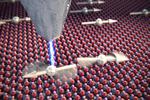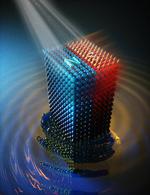Other

“Physicists at Delft University of Technology have built a new technology on a microchip by combining two Nobel Prize-winning techniques for the first time. This microchip could measure distances in materials at high precision, for example underwater or for medical …

“Researchers from TU Delft have constructed the smallest flow-driven motors in the world. Inspired by iconic Dutch windmills and biological motor proteins, they created a self-configuring flow-driven rotor from DNA that converts energy from an electrical or salt gradient into …

“Associate Professor Mazhar Ali and his research group at TU Delft have discovered one-way superconductivity without magnetic fields, something that was thought to be impossible ever since its discovery in 1911 – up till now. The discovery, which was published in …

“The new building blocks of the quantum computer of the future are being produced in a present-day chip factory. Researchers from QuTech — a TU Delft and TNO collaboration — and Intel showed that this is possible. They achieved this major technological …

“Quantum technology typically employs qubits (quantum bits) consisting of, for example, single electrons, photons, or atoms. A group of TU Delft researchers has now demonstrated the ability to teleport an arbitrary qubit state from a single photon onto an optomechanical …

“How materials behave depends on the interactions between countless atoms. You could see this as a giant group chat in which atoms are continuously exchanging quantum information. Researchers from Delft University of Technology in collaboration with RWTH Aachen University and …

“A team of researchers from QuTech in the Netherlands reports realization of the first multi-node quantum network, connecting three quantum processors. In addition, they achieved a proof-of-principle demonstration of key quantum network protocols. Their findings mark an important milestone towards …
“The heart of any computer, its central processing unit, is built using semiconductor technology, which is capable of putting billions of transistors onto a single chip. Now, researchers from the group of Menno Veldhorst at QuTech, a collaboration between TU …

“An international team led by researchers of Delft University of Technology (TU Delft) has managed to manipulate the magnetic state of a magnetic material by optically shaking it. The whole process happens within an extremely short time frame of less …
“New research by scientists from Delft University of Technology and the University of Duisburg-Essen uses the motion of atomically thin graphene to identify noble gases. These gases are chemically passive and do not react with other materials, which makes it …

